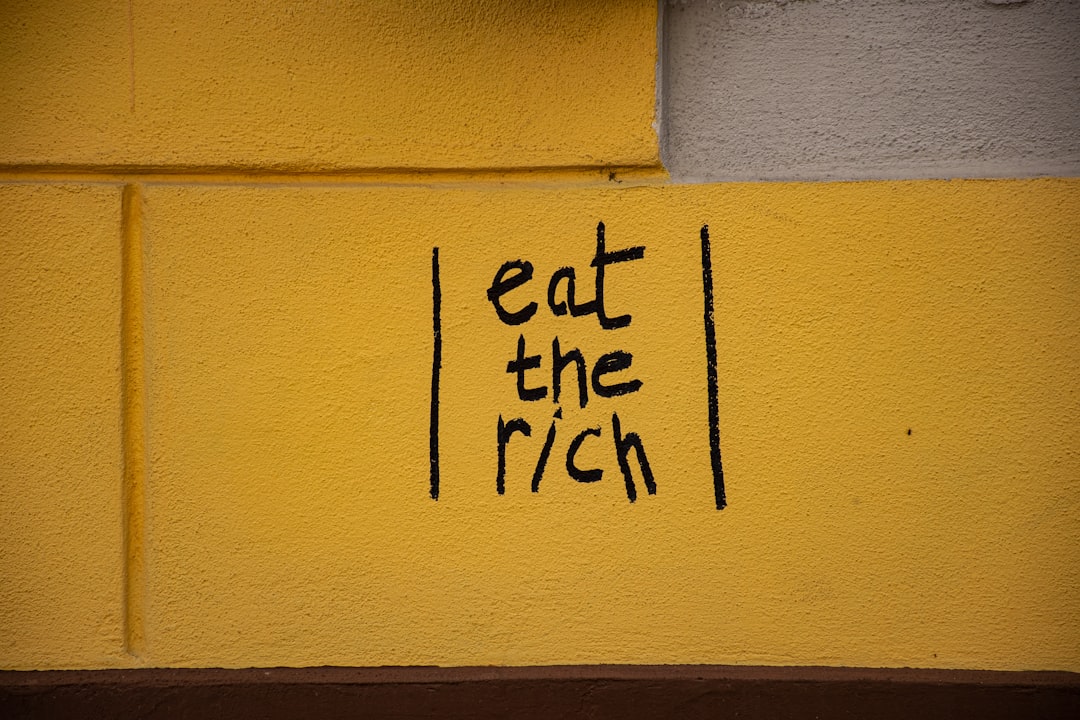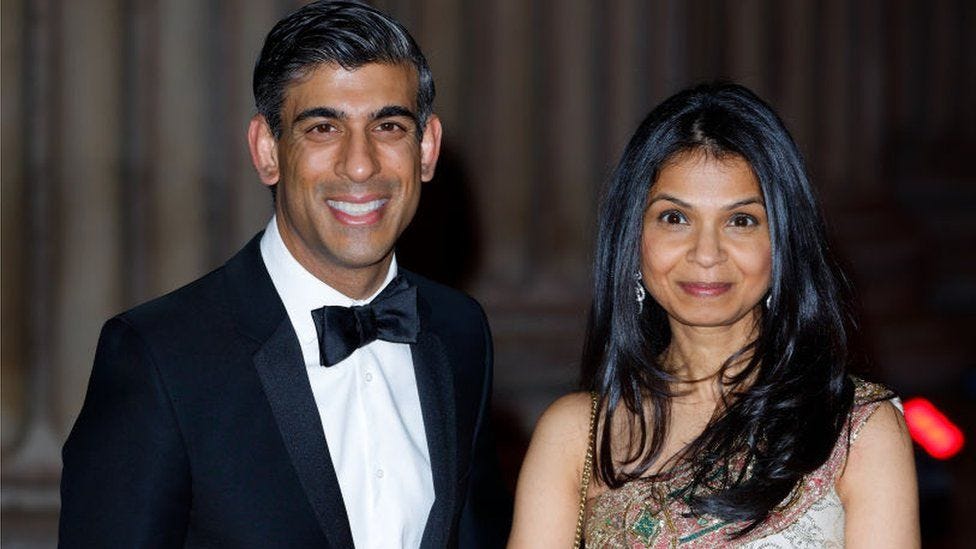Rishi hit the Rich List – but it’s cooking lessons for the rest of us
The chancellor is the first frontline politician to make it onto The Times’ lowdown of the loaded. But if you're feeling the pinch, fear not – his colleagues are here to help us all save a bob or two…
Hello, and welcome to this weekly free newsletter from The Flock with Jennifer Crichton. Just a reminder that you can support the work that goes into this newsletter, and access all manner of extra columns, interviews, audio content and conversation throughout the week, by becoming a paid subscriber.
From sexual harassment to partying in lockdown, suitcases of wine and driving-based eye tests, it’s safe to say the current occupants of Westminster have graced our front pages with very little grace in recent months. This was not the week in which that changed.
Having become the first prime minister to be fined by the police while in office, Boris Johnson now officially presides over the most lockdown-breaching building in the UK. By the close of its unfathomably opaque investigation this week, the Met Police had issued 126 fixed penalties to attendees of Downing Street’s lockdown festivities. Somehow, only one fine was given to Bojo so he’s staying put, but the reactionary reshuffle was carried out regardless.
Meanwhile, Pestminster’s pests carry on pesting. The MP caught watching porn in parliament says he may stand as an independent candidate in the by-election he prompted with his own resignation – I guess even Dominators™ pale in comparison to the cut and thrust of the Commons – while another unnamed (except on Twitter) MP remains on the payroll following his arrest for rape, the only person now being actively encouraged by Downing Street to work from home. Reportedly, 56 further MPs remain under some form of sexual impropriety investigation. The PM, high on his one-fine glory, seems barely to have noticed.
It would be easy then, amid that picture of abject fuckwittery, to believe the government had already tested the public’s incredulity to the max. Yet, despite the numerous grotesqueries of recent parliamentary antics, I have to admit I didn’t see Downing Street’s latest front-page first coming.
For today, on the cover of the Sunday Times Rich List, sits chancellor Rishi Sunak, high on life as the first frontline politician in history to make it into the annual lowdown of the loaded.
The timing couldn’t have been better – or worse, depending on your perspective. Sunak’s debut at number 222 was unveiled less than 36 hours after he warned millions struggling to pay their food and fuel bills about a “tough” few months ahead. I mean, he’s only the chancellor. What do you expect him to do about it?
Just days prior, as inflation hit 9% – the highest rate in 40 years – the governor of the Bank of England raised anxiety levels (and eyebrows) with a warning food price rises were about to become “apocalyptic”. A poll by Sky News revealed one in four families had already resorted to skipping meals to pay their fuel bills. The UK’s largest wholesaler warned schools could no longer afford to adequately feed our kids. Sunak, whose family members famously all favour their own breads, responded by blaming global markets and reiterating his opposition to an ‘unconservative’ windfall tax on the oil and gas industry.
A lesser man might worry about appearing so out of touch with the public mood. But since his initial rise to Instagram popularity – a politician in Common Projects sneaks is still a politician, kids – Sunak doesn’t appear to have concerned himself too much with reading the room. This is a man, after all, who moved his wife (and Rich List doubles partner) Akshaty Murty out of number 11 Downing Street in a fit of pique after the British public had the audacity to question her decision to claim non-dom status while living there.
Sunak’s argument then was that, as a private citizen, his wife was entitled to manage her own financial affairs outside the glare of public scrutiny. One wonders what such a ‘private’ couple will make of their joint entry onto the list as a result of that very tax scandal making their combined £730m wealth public.
Still, at least Murty and Sunak’s method of moving from rich to richer – paying £30,000 to avoid a £20m tax bill and keeping as much of your cash to yourself as possible – suggests a basic understanding of how money actually works. That’s more than can be said for the rest of the cabinet, whose public musings on how best to ride out the cost of living crisis suggest there are still some suitcases of booze hanging around at Westminster.
Let’s start with televisual newcomer Rachel Maclean, the minister for safeguarding, shall we? Taking to the cornflakes and coffee slot on Monday morning, she endeared herself to the nation by proclaiming: “We need to have a plan to grow the economy” – yes, Rachel – “and to make sure that people are able to protect themselves better,” – YES, Rachel – “whether that is by taking on more hours or moving to a better paid job.” Oh.
Find a better paying job. Why didn’t we think of that? I’ll bet the 91,000 civil servants Boris Johnson plans to lay off will be thrilled to hear it’s that easy.
For those who can’t just ‘find’ a better paying job or buy themselves out of paying tax like the Sunak-Murtys, Thérèse Coffey was there to double down on the suggestion of working more hours. Of course, that’s not altogether feasible if you’ve been axed as part of a threat-based campaign to get more civil servants back to the office, but let’s not dwell on that, for the government guidance doesn’t end there.
For Britain’s unemployed, workers on zero hours contracts or those unable to access benefits because their partner has an income (spousal financial independence being for chancellors, not proles), George Eustice MP has been on hand to introduce the concept of value ranges, explaining: “What people find is by going for some of the value brands rather than own-branded products, they can actually contain and manage their household budget.” Brilliant! Meanwhile, Lee Anderson plans to sweep in on a white horse and teach us all to cook – because, as he says, those reliant on food banks are only in that position because they “cannot cook properly” and “cannot budget”.
These MPs make it all sound so easy, as though the only thing standing between low-earning households and the high life is their own willingness to improve their lot. Yet, when Money Saving Expert Martin Lewis admits he’s “out of tools to help people” with the rising cost of food and fuel, you know something is amiss.

Indeed, earlier this week, as The Times was preparing to reveal Sunak’s inclusion on the Rich List, Lewis was busy apologising for having lost his temper with energy regulator Ofgem. The usually unflappable financial guru tweeted: “I'd like to formally apologise to the @ofgem staff for losing my rag in a background briefing just now and saying its changes are a ‘fucking disgrace that sells consumers down the river’.”
The source of Lewis’s wrath? Ofgem’s decision to extend rules that will effectively prevent suppliers from offering lower-priced deals if wholesale energy costs fall. The regulator admits further rises in autumn could push the average home’s energy bills beyond £2,600 a year – 2/3rds of a single person’s Universal Credit income – but says its current priority is to protect suppliers from closure, not people from financial ruin.
Which is the whole problem in a nutshell really, isn’t it? From parliament to Ofgem, the publicly-funded bodies that exist to protect the needs of the populace are doing anything but. Companies come first now. The safety net’s been pulled away. We’re all on our own.
Still, at least Rishi Rich will be able to ride out the recession in style. You can read all about his multiple properties and savvy investments at the breakfast table this morning, if you can stomach it. Just remember to ration your value brand flakes as you do…
How do you feel about the cost of living crisis? Are any of these government interventions helping – or just showing MPs up as out of touch? Should politicians make the Rich List? I’d love to hear your thoughts…








And Nadine Dorries claims that Channel Four paid people to act poor when she was in a reality programme designed to help rich people understand poverty! The inability of many politicians to step into someone else’s shoes and recognise why inflation on essentials really does hit the poorest first is frightening.